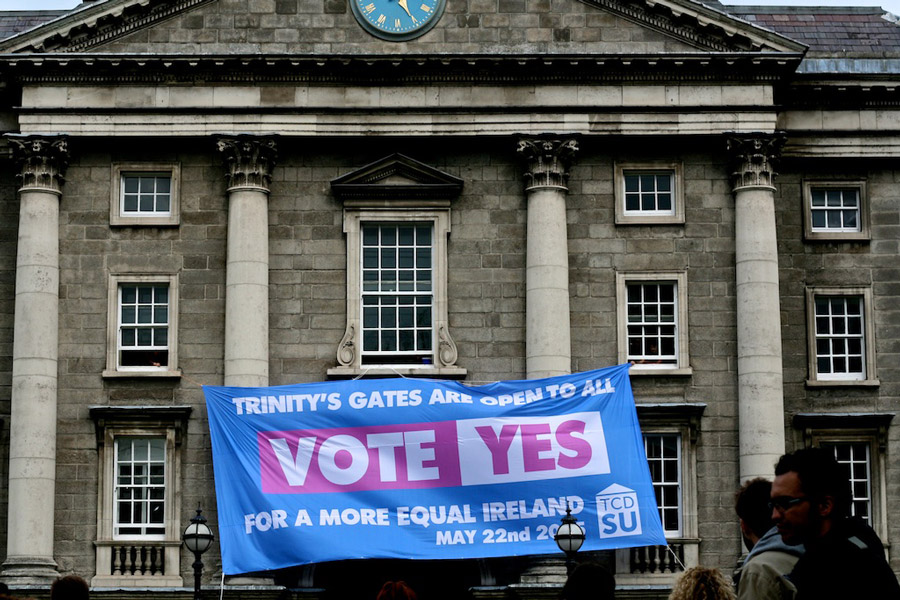A students’ union, more than any other body in college, acts as a catalyst for the things that students want from their time in third-level education. By universally representing the student body, it manages to be a voice for everyone on campus.
Or so they would tell you. But the reality is a more nuanced and disappointing fact. By making people join and fund an organisation that claims to represent their views, with no ability to opt out, the students’ union fails to represent anyone sufficiently. This is the claim of “Irish Students for Free Association”, a lobby group founded last year by a UCD graduate, with the aim of asking each student to give their “expressed permission” to join the union of their college, rather than having mandatory membership. The founder of the movement, Samuel O’Connor, started the group as a response to UCD Students’ Union’s stance on abortion rights, wherein the union had chosen to support the right of a woman to terminate a pregnancy, based on a referendum where 45 per cent of polled students voted in favour of the policy.
If I were forced to join UKIP, I’d probably be quite mad at whoever forced me to do so.
In light of Trinity College Dublin Students’ Union (TCDSU)’s repeal the eighth campaign, a vocal minority has expressed their disappointment at being part of an organisation which has campaigns to which they are “morally opposed”. This is entirely understandable. If I were forced to join UKIP, I’d probably be quite mad at whoever forced me to do so, and it thus seems logical to allow people to opt out of campaign groups that they don’t support.
This piece, I should say now, should not be read as a declaration of my opinion on the repeal the eighth campaign. Other people – particularly women – have given better explanations of the needs and wants of both sides of that debate, and I feel neither entitled nor able to weigh in on the issue myself.
However, it’s problematic that membership of the union is mandatory to begin with. It’s bizarre and even unethical to make people join a body that holds political stances that they may not agree with. I’d be the last person to say that the union should avoid campaigning, given that there are huge benefits to the union acting as a catalyst for involvement. The “#RingYourGranny” video during the Marriage Equality referendum – along with the union’s voter registration campaign and the countless other things we did to support the cause – was a tremendously useful and powerful force for good. However, I still don’t think that general good is a justification to presume the support of every student for stances that are controversial.
If the union wants to support stances that not all students agree with, why do they insist on taking everyone along kicking and screaming?
If the union wants to support stances that not all students agree with, why do they insist on taking everyone along kicking and screaming? If people like Samuel O’Connor want to leave their union, why don’t we let them? If you stop supporting the ideals of a political party, you can leave the party. The party is better off for it, because it’s a more cohesive and unified body. Campaigns for repealing the eighth and marriage equality will in future be stronger when their loudest critics can leave the room. It is a waste of union time, resources, and political clout to facilitate the opinions of minorities who would often be happier to leave.
The biggest problem with a voluntary students’ union has nothing to do with politics: it’s a problem of management. If students choose to opt out because of a moral disagreement with the union’s positions on social issues, it would be difficult, if not impossible, to deny union services to these people. Would we demand a union membership card for every sandwich in the SU café or ticket to an Ents night? Would we be happy for the welfare officer to demand a union membership card of every student who came by to discuss their mental health or grab some condoms, and deny these services to anyone who had opted out? There are nuanced problems with the idea of a voluntary union that need to be considered, and any kind of judgement as to which approach is better will be incredibly subjective.
No matter what, I will continue to be a happy member of TCDSU. In general, I think the union does a good job and I don’t know if a voluntary union would be better or worse than the status quo. And it could lead to worse problems, like the denial of support services to people who need them. I do think that this is a discussion we need to have as a college, in order to please as many people as possible, but I think it’s a discussion we’ll inevitably and unfortunately leave off the agenda.







